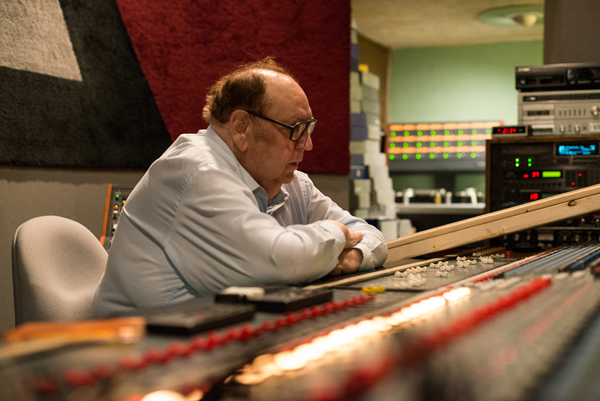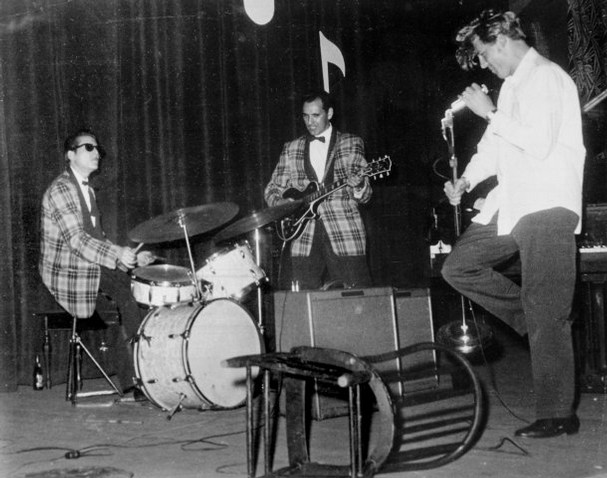I STILL MISS SOMEONE
By Peter Guralnick
Roland Janes, 1933-2013
 Roland Janes at Phillips. Photograph by Ronnie Harris
Roland Janes at Phillips. Photograph by Ronnie Harris
I really loved Roland.
But then so did everyone else who really knew him.
I could try to be clever and say it was for his virtuosity (Roland, a master of mischievous word play, would undoubtedly frown on that), because he was indeed a brilliant guitarist, who provided all those carefully calibrated, arrestingly spontaneous solos and rhythm patterns on so many of the Sun Records classics.
But that, of course, is not what I am speaking of here.
I’m speaking, really, of a virtuosity of spirit, which no one who ever encountered the man could miss. A virtuosity—a generosity of soul that is universally praised, often sought after, but rarely attained. And in Roland’s case, like his guitar playing, it was achieved without visible effort, scarcely ever calling attention to itself.
If you ever visited the Sam C. Phillips Recording Studio at 639 Madison Avenue in Memphis, you would know Roland Janes. He was there managing the studio, engineering sessions, greeting the world, every day more or less for the last thirty years, working with everyone from Charlie Rich to Memphis rappers Three 6 Mafia and Al Kapone to Bob Dylan, Jerry Lee Lewis, and anyone who might wander in off the street looking to cut a “personal” record, the same way Elvis once did at Sam’s original studio at 706 Union around the corner.
At that original Sun studio Roland played on just about every hit (and, he would be quick to point out with a dry chuckle, on even more misses) that came out on the label from mid-1956 on. He arrived with Jack Clement and Billy Lee Riley that summer, going on to play the blazing double-whammy solo on Riley’s “Flyin’ Saucers Rock ‘n’ Roll.” But it was, really, with Jerry Lee Lewis’s arrival at the tag end of the year that he would cement his place in rock & roll history. How many times have you heard Jerry Lee’s exuberant shout, “Ro’ Boy,” as he exhorts the otherwise nameless guitarist to take yet another perfectly conceived, perfectly concise solo? It’s for his musicianship most of all, of course (along with his own short-lived but influential Rita label and his Sonic Recording Studio, one of the principal progenitors of the Memphis garage-band explosion of the '60s), that Roland was named to the Memphis Music Hall of Fame just last month.
 Roland Janes (center) with Jerry Lee Lewis (right)But forget that. I mean, don’t forget the music—don’t ever forget the music. But forget the brilliant solos, and forget the accolades (as Roland said about fame, “I never really cared about any of that”) if you want to try to understand the spirit of the man.
Roland Janes (center) with Jerry Lee Lewis (right)But forget that. I mean, don’t forget the music—don’t ever forget the music. But forget the brilliant solos, and forget the accolades (as Roland said about fame, “I never really cared about any of that”) if you want to try to understand the spirit of the man.
Anyone who stopped by the studio, I don’t care for how long, could not miss that spirit. He was such a kind man. He was such a smart man. He was such a decent and committed man—and by “committed” I don’t mean to suggest anything like the quality that politicians often cite when referring to their own inflexibility. I mean, he was committed in the same way that Sam Phillips proved himself to be over and over again in the studio, committed to bringing out the best in you, committed to exploring the you of you, whoever you were, however you presented yourself, however sophisticated or unsophisticated your tastes. Not that Roland was above kidding around with you. Sometimes after a particularly bad pun, Roland might simply engage you with a quizzical look, as if to say, I hope you got that, it wasn’t really that hard. But mostly he was in the business of encouraging you to be the best “you” you could possibly be.
I’m not sure when I first met Roland—it must have been over thirty years ago—in the studio, of course—but there was no end to our meetings and, given Roland’s nature, I’m sure there will be no end. I remember when we were recording the Charlie Rich album, Pictures and Paintings, in 1991, it was Roland, who was second engineer on the session, who was, really, the key to its success. It wasn’t that Charlie didn’t have a lot to say; as Sam Phillips always said, it was almost as if he had too much to say, but given his deeply introspective nature too often it stayed bottled up inside. It was hard for Charlie—he had an intrinsic fear of letting go (he would tell you it was “anxiety panic disorder”), but even though Sam’s sons, Knox and Jerry, were present most of the time, and Scott Billington did a wonderfully sympathetic job of producing, it was only Roland who had the capacity to make Charlie feel—I’m not going to say at ease, but at home. And not just because they were old friends and colleagues. And not because of anything special that Roland said. It was just—Roland.
Just like Sam, whom he thought the world of (if Roland was everybody else’s mentor, Sam Phillips was his) he was a teacher—without all the big words that Sam used maybe but with the same sure sense of purpose. Every year his Christmas story provided an illuminating lesson. These were not conventional Christmas greetings—they were not just the usual well-intentioned summaries of family events over the last calendar year. They were more like real-life short stories with a strong moral underpinning. One of my favorites was 2011’s “House of Broken Dreams,” which began “In my younger days I fancied myself to be a fine guitar player and singer” and then went on to paint a picture of the pawnshop owner who had given him a boost back in those early days. With another aspiring young musician, Roland (or the unnamed protagonist) had rented a room over the pawnshop, which was called “The House of Broken Dreams.” As Roland tells it, the name was something of a misnomer, if only because of the kindness of its owner, Mr. Oscar, a Holocaust survivor. Well, I’m not going to tell you the whole story, it’s more of a meditation, really, but it led Roland to his usual Christmas conclusion: “Let me wish a Merry Christmas to one and all—and to all A GREAT LIFE.”
We shot video interviews for the enhanced digital editions of my books in the studio this past spring. One of the highlights was a conversation with Roland—not an interview exactly, the intention was always conversation. But as we were talking about Jerry Lee Lewis, whom Roland has always cherished not just for his genius but for his fundamentally good-hearted character, Roland evidently decided it was time to turn the tables on me. If this was really a conversation, then he wanted to ask me some questions, too. “Well, how’d you get started, Peter?” he said. “How did you first get into this music?” And while we were at it, he wondered how I had come to write my first book. He imagined I must get quite a bit of satisfaction out of the writing, he said. And then we started talking about the satisfactions to be derived not just from writing or music but from any form of creative engagement.
The last conversation I had with Roland, when he first got sick last month, he wanted to know how the video project was going. I told him it was going great—it was really fun to work with my son, Jake, and Memphis writer and filmmaker Robert Gordon, and it was always great to work on any project with him. “So you feel good about it, Peter?” he said. I told him that I did. “That’s good,” Roland said. “That’s good.”

